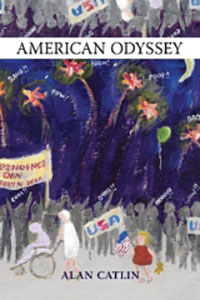Charles Rammelkamp Review of
American Odyssey by Alan Catlin
“American Odyssey”
Poetry
FutureCycle Press, 2016
$14.95, 74 pages
ISBN: 978-1938853968
It might be misleading to describe Alan Catlin’s powerful new collection of poems as ekphrastic, since the term conjures a vision of paintings, sculpture, fine art, and so many of these poems are inspired by the work of photographers, including photojournalists, whose work is more about social critique than aesthetics. American Odyssey is a journey through the nightmare aspects of the American Dream.
The title comes from a poem in a series of poems which open the collection, poems that are inspired by Mary Ellen Mark, the photojournalist whose work includes Ward 81, photographs of female “patients” in the maximum security section of Oregon State Hospital, and Streetwise, teenagers in Seattle living on the streets.
Just as Gene McCormick’s cover art depicts a wholesome Independence Day parade heaped with understated cynicism, “Mary Ellen Mark’s American Odyssey” conflates onlookers at a Memorial Day parade with a cavalcade of the American freaks Mark photographed:
the shelter kids, Halloween-costumed orphans
left behind on streets without dreams on city corners
in wicker baskets or in dumpsters like so much garbage
people close their eyes to in order not to see;
families in cars, in twenty-dollar motels for a night,
all six of them and the pets, filthy clothes washed
in sinks hung out to dry on shower stall rungs and
towel racks, six hours in occupancy and the room
is as totaled as the car left at the side of some
unnumbered road, already rusted and ravaged, seeming
as if it somehow had always been there; preteens
in wading pools sharing a smoke or dressed like ten-
dollar whores by the boardwalk; adolescent beauty queen
contestants, the winners and the losers, full immersion
river Baptists, be-robed elevated train prophets and
their handlers working aisles, donations on demand;
survivalist family training camps, children with guns….After the half dozen or so Mark poems comes a series inspired by Robert Mapplethorpe’s photos of androgynous females – Laurie Anderson, Eileen Myles, Patti Smith – and others of his that likewise blend the contradictory, such as “Mapplethorpe’s Hand and Flower (1)”:
The image is all about simplicity:
a contradiction in terms,
two objects in opposition,
carefully arranged and juxtaposed:
a hothouse orchid and a man’s
clenched fist, anxiety and grief;
the longer they are observed,
the more similar they become.We can already see where Catlin is going with this, as if letting us in on a joke (American Joke might be an alternate title for this collection). The next series of poems, which takes off from the work of the illustrator/caricaturist Ralph Steadman, confirms this impression – Steadman’s Freud, Steadman’s Macbeth, Steadman’s Milosevic and my favorite, “Ralph Steadman’s The Brain of Dr. Hunter s. Thompson According to Gray’s Anatomy,” which seems to take off from Steadman’s famous cover illustration for Fear and Loathing in Las Vegas, but could refer to any number of Thompson illustrations. Thompson, too, famously savaged the American Experience in his gonzo journalism.
Through several more brilliant sequences – “Dream Dates” with various suicides and otherwise troubled female artists – Plath, Sexton, Woolf, Diane Arbus and Billie Holiday among them; “Our Lady” poems involving dubious saints (of Kitchen Appliances, Contraptions, and Trenches, among them), and a series inspired by the Vietnamese-born poet Quan Barry – Catlin expands the freakish universe beyond American shores.
Movingly, the collection comes to an end with a ten-poem sequence inspired by the REQUIEM exhibit of photography by photographers who died in Vietnam and Indochina. Of course, these are pretty bleak scenes of war, perhaps the most heartbreaking of which are the ones about uprooted Vietnamese families caught in the crossfire. Think of the Syrian refugees today. “Young Girl with Two Kittens, a Chicken and Her Father’s Rifle, Vietnam, 1974” shows a picture of a family preparing to flee, hastily packing their belongings into boxes.
The rifle the child is guarding
should be an incongruous element in
this arrangement, but this is so clearly
a war zone where the only hope is
escape, that it is all the details of domestic
life that are out of place, unnecessary,
soon to be of no use.Again, the juxtaposition of opposing elements, the normalizing of the horrific.
Alan Catlin’s poetry is often grim, focusing on people who have gone off the rails either deliberately, stupidly, or from substance abuse or lack of self-control, or just plain having the deck stacked against them. American Odyssey fits this theme but elevates the pain to a level of the zeitgeist, as if all this suffering is not simply tragedy foretold but the unflinching observation that this is how the world works, always has, always will, no matter how we candy-coat or pretend it’s the anomaly.
-- Charles Rammelkamp
